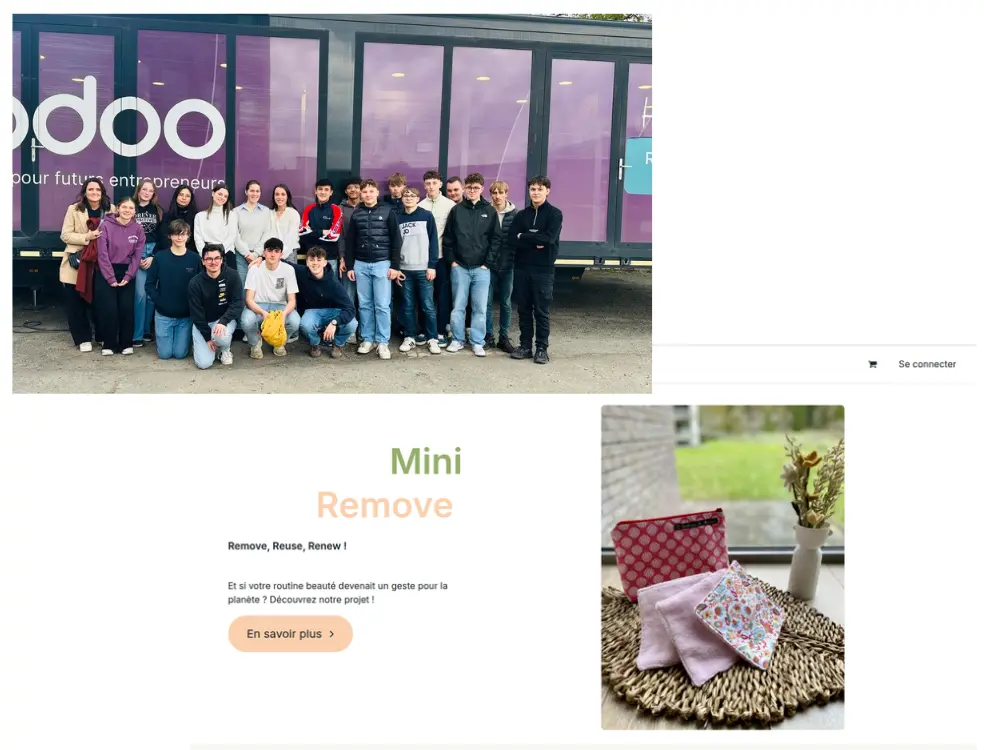Since last year, final-year economics students at the Athénée Royal Ardenne Hautes Fagnes Malmedy have been actively participating in the mini-companies project. Supported by Les Jeunes Entreprises (LJE) and Odoo, they create and manage a business from A to Z, from product design to commercialization, including stock management, accounting, and marketing.
Setting Up the Project
Stéphany Wertz, the teacher responsible for the project, starts talking about it to the students at the end of the 5th grade. An introductory activity led by LJE allows each student to discover their personality profile through a color system. This analysis then helps distribute roles within the mini-companies: a "red" profile student will be more suited to leadership, while a "yellow" profile will gravitate towards creation and marketing. The students, organized into groups of about eight, are assigned key roles: CEO, finance, marketing, production, human resources, and communication.
By the start of the 6th grade, the project takes on a concrete dimension. Each group must design a company and define its offer while adhering to the rules imposed by LJE. Emphasis is placed on sustainability and social responsibility, a core value for Stéphany.

This year, three mini-companies were created: Woody'z (wooden board games), Tipic Jeans (recycled denim bags), and Mini Remove (reusable makeup wipes and pouches).
From Theory to Practice
To finance their project, students sell shares for two weeks, raising initial capital. This capital must be repaid, sometimes with interest, providing an initial immersion into the financial management of a business. At the same time, the students familiarize themselves with the responsibilities of their roles and follow a strict timeline marked by key events and deadlines. To guide them, LJE provides various documents, tutorials, and videos.
Until November, Stéphany dedicates one hour per week to meetings where students can advance their project. She also ensures that they learn essential concepts such as break-even point, marketing, leadership, and management. The goal is for the students to acquire these concepts early on so they can apply them throughout the development of their mini-company.
In mid-November, students participate in the general assembly of the cooperators, a key moment in the project. They present their work, relying on market research, financial planning, and marketing strategy to demonstrate the viability of their mini-company.
Using Professional Tools
Throughout the year, the students manage their mini-company like real entrepreneurs. LJE provides them with various tools to manage their accounting, work hours, and meeting reports. Meanwhile, Odoo enriches this experience with additional free tools through its Education Program. Following their introduction to the ERP in the LabOdoo in the 5th grade, the students in the 6th grade received e-commerce training provided by an Odoo Education Officer. As a result, they were able to create their own website and make sales through their e-commerce platform. Next year, if they decide to go further, they could also manage their mass mailing on Odoo.

The use of professional business management software deepens the students' immersion in the entrepreneurial reality. Every aspect of their mini-company is designed to reflect the functioning of a real company. They must handle the ONSS, VAT, and payroll taxes, just like true VAT-registered businesses. Additionally, they have to pay themselves a salary, which makes them aware of the challenges of making a business profitable while managing financial burdens. Odoo enhances this experience by providing them with professional tools that better prepare them for the demands of the workforce.
The project comes to an end in May with a closing meeting, at which the cooperators are invited to a financial and strategic review of the company they have invested in.
Evaluation
Stéphany Wertz is one of the few teachers to make the project mandatory and assess it as a replacement for the end-of-study project. At the start of the 5th grade, students enrolled in the economics option and their parents sign a contract confirming that this project will be an integral part of their evaluated curriculum. The evaluation consists of several stages: an interim report, video recordings of the two assemblies, a final thesis, and an oral exam. During this exam, Stéphany asks questions about all departments of the company, not just the one the student was involved in. The goal is to ensure a comprehensive understanding of how a business functions.
A Challenging but Formative Project
While the project demands significant investment, both from the teacher and the students, the benefits are immense.
Some students may occasionally feel demotivated when they face obstacles. However, this project enables them to develop invaluable autonomy as well as soft and technical skills that will stay with them far longer than purely theoretical knowledge. In addition to enhancing their adaptability and initiative, these skills are highly valued in the job market and provide a distinct advantage for their professional integration.
Mini-companies evoke intense emotions, both positive and negative. This project serves as an excellent exercise in teaching students to manage their emotions, a challenge that is especially complex at their age. The near-real nature of the experience sometimes even impacts parents, some of whom become personally involved out of fear that their child’s company might encounter difficulties or even go bankrupt.
This story is a perfect illustration of how a well-supported project, backed up by professional tools such as those offered by LJE and Odoo, can transform a classroom into a veritable incubator for future entrepreneurs.
